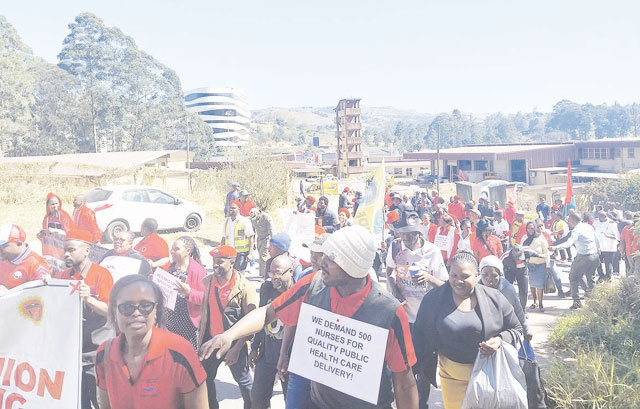By SIFISO NHLABATSI AND SIBONISO NKAMBULE | 2023-09-15

The on-going problem with drug shortages is rising to the level of ‘disaster’ as nurses have said they have lost hope that the situation would be solved anytime soon.
The healthcare workers said the drug shortages continue to take an enormous toll on them as they must deal with the problem on a daily basis, and also on patients who are on the receiving end of the shortages.
They said some of the medication in short supply or lacking, were Endotracheal tubes which serve to provide oxygen and inhaled gases to the lungs and protects the lungs from contamination, such as gastric contents or blood. These are used in the theatre.
Beside the Endotracheal tubes, the healthcare workers said there was a serious shortage of diagnostic agents and vaccines for below five years.
It was also revealed that the theatre were among the most affected departments as they were working on tight schedules.
The healthcare workers further revealed that some patients were told to go and buy what is required before an operation.
The situation, according to the healthcare workers, got worse each day, accusing government of making unfulfiled promises.
This comes as some patients were yesterday turned back at the Mbabane Government Hospital and Raleigh Fitkin Memorial Hospital in Manzini as a result of the drug shortages and other medical equipment.
Further compounding the situation for the patients is that their last place of hope, The Luke Commission, has revealed that it was faced with financial challenges, which may result in the facility closing its doors to patients.
With the high costs of medication at pharmacies and also private hospitals, patients end up at The Luke Commission where they are treated free of charge by trained specialists and also get free medication.
However, The Luke Commission due to the financial challenges may close its doors to patients as the numbers continue to increase. Last year, the facility attended to 217 363 outpatient visits and for this year, projections are 274 578 outpatients’ visits and for next year, it is projected that the visits will shoot up to 337 420.
Some of the patients, who were turned back at some of the government hospitals, shared their concerns and frustrations.
The patients sad they were concerned by reports to the effect that with time they might not be helped at The Luke Commission, which was where nurses in public health facilities refer them.
Patients said they had hoped that by now the issue of medical drugs shortages would have been sorted, especially when considering that a number of petitions had been delivered to various government departments.
One of the patients shared how he was only asked what the problem was and thereafter given a prescription to purchase medication at a pharmacy.
The patient revealed that he was involved in an accident and was experiencing pain and thought perhaps an x-ray and medication would have helped to ascertain what the problem was.
Much to his dismay, even though an x-ray was conducted the only medication he got was painkillers (Panado) and thereafter he was turned back.
The patient said he endured so much pain a few days later and ended up going to a private doctor who helped him.
Healthcare workers from the public institutions further stated that they were also burned out due the shortage of nurses.
Physically
They disclosed that they were fatigued both emotionally and physically and were overwhelmed with the burdens of practicing medicine under the impediments they face every day such as the barriers to delivering care in an equitable manner.
Swaziland Democratic Nurses Union (SWADNU) Secretary General, Mayibongwe Masangane, said the situation had escalated, adding that they were losing hope.
“We are losing hope, the situation is becoming worse. Hospitals are transferring patients to nearby facilities, which still have the needed drugs and services but this is not the solution,” said Masangane.
He said the facilities, which still could offer the services and had the medication, would also run out of those drugs and no longer be able to service the transferred patients.
The secretary general said judging by the reports they have been getting, he doubts that the remaining facilities would be able to service patients for more than a week if the situation continues to get worse.
He said theatres would not be operational. Masangane said surgeries would be impossible if there were no material or Anaesthetics.
According to the secretary general, some theatres opted to stop bookings and were only accepting emergency cases.
He said for some people it was prescribed what they would need to purchase from pharmacies before they were operated on, adding that this was unattainable.
When delivering the petition last month nurses disclosed that the shortage of these critical medical supplies renders the provision of quality health services in general and nursing care in particular to be of no use to the patient.
Director of Health Services, Dr Velephi Okello, acknowledged the challenges saying they had noticed a slow-down in the deliveries of drugs by suppliers.
“The ministry is still following up as some suppliers have recently been paid. We will negotiate for expedited deliveries from those who have been paid already,” she explained.
Family planning commodities out of stock
Swaziland Democratic Nurses Union (SWADNU) revealed that drugs including, antibiotics and anti-inflammatory drugs and family planning commodities, among others, had been out of stock for a very long time.
These are part of the drugs the unions said they wanted to bring to the ministry of health’s attention through their petition, which they were unable to deliver after being stopped by the police in their march.
The police prevented the march because the union did not have permission to march from the Municipal Council of Mbabane.
The petition, according SWADNU Secretary General, Mayibongwe Masangane, was to call upon the ministry to address the challenges faced by the health sector, being the shortage of drugs and medical supplies, shortage of housing and the creation of new nursing posts, among other issues.
Masangane said the drug shortages challenge had plagued the ministry for over 20 years now.
He said they had consistently raised this issue with government with no positive effect, rendering their efforts to provide quality healthcare ineffective.
Adding, he said drugs and supplies, including antibiotics, antihypertensive, anti-inflammatory, intravenous fluids catheters, endotracheal tubes, nasogastric tubes, diagnostics agents and wound dressing paraphernalia, among others, had been out of stock for some time.
Patient
He explained that the shortage of these critical medication and medical supplies rendered the provision of quality healthcare services in general and nursing care, in particular, to be of no use to the patient.
“We believe that there is no political will to avert this crisis. Moreover, the challenge will be resolved by reviewing the healthcare financing model. We believe that the out of pocket payment system is not sustainable in the long run,” Masangane said.
The union demanded the procurement and distribution of drugs and medical supplies to health facilities across the country.
Quality
He said there was a significant shortage of nurses in the country, adding that this had compromised the quality of healthcare services and patient's safety.
“Nurses are readily available in the labour market and the demand for their services is ever increasing. We note that many competent nurses have been waiting for years for promotion, which is demoralising and discouraging,” he said.
Despite failing to deliver the petition, Masangane highlighted that they would set another day where they would deliver the same petition to the ministry with the hope that their concerns would be addressed.
There is progress in rectifying situation - Minister of health
Minister of Health, Lizzie Nkosi, said there were positive developments in addressing the drug shortages.
The minister said on the issue of the petition, which was delivered by SWADNU demanding medical drugs, which were in shortage, a report has been prepared for the Cabinet sub-committee.
Nkosi was this week on national radio where she stated that the forensic audit into the drug shortages at the Central Medical Stores had been completed and was now subject for discussion in Cabinet.
Deliberating
She said she was not privy of the contents at the time she was called but stated that Cabinet would decide on the next steps after deliberating on the report’s content. Government engaged the services of Funduzi Forensic Services to conduct investigations into the supply of medicines to public health facilities and it is expected that once the investigations are complete a report will be presented to government with findings and recommendations.
Transferring
The minister also brushed off the issue of transferring patients to other hospitals as alluded to by the SWADNU saying this was nothing new as it was common practice.
She said patients were transferred quite often to follow services that were available in other facilities.
“That is what referrals are about. These could be specialist skills or specialised equipment or to decongest a facility that has a long waiting list,” Nkosi stated.
share story
Post Your Comments Below

Sisonkhe FC ……........….. (0)2
Mpendulo 55th, Thab...
Health officials have reported a significant decrease in new HIV infections among men, in...
Social media users have reacted with shock and sorrow to the death of former Mhlume Unite...

THE recent turn of events at SwaziMed has underscored deep-rooted governance challenges that thre...
All material © Swazi Observer. Material may not be published or reproduced in any form without prior written permission.
Design by Real Image Internet